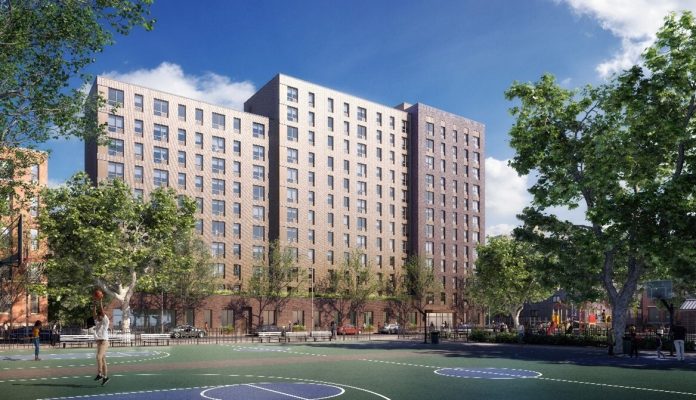New York Construction Report staff writer
Construction is set to begin on a new 11-story residential building in Clinton Hill that will expand a unique housing model designed to help parents living with serious mental illness or substance use disorders reunify with their children.
The Emerson-Davis Family Residence redevelopment will create 103 apartments at 161 Emerson Place, including 61 supportive housing units and 41 deeply affordable homes for households earning up to 60 percent of the area median income. One unit will be reserved for a live-in superintendent. The project replaces a decades-old building operated by the Institute for Community Living (ICL), which has run the program since 1999.
ICL’s model — still the only one of its kind in New York City — offers stable housing integrated with behavioral health services and reunification support, helping families stay connected and avoid long-term separation. The redeveloped building will expand capacity and include units specifically designed for families with children, pregnant individuals, and parents working toward reunification.
“ICL’s Emerson-Davis model has demonstrated what’s possible when you combine supportive housing with family reunification services tailored to the unique needs of parents with behavioral health challenges,” said ICL president and CEO Jody Rudin. “Housing is health care — and for families at risk of separation, housing is also the key to staying together.”
Residents will have access to on-site trauma-informed therapy, parenting classes, and community integration services, as well as ICL’s Child and Family Treatment and Support Services. Amenities in the new building will include a children’s activity room, a community room with a teaching kitchen, a fitness center, and a tenant work lounge.
Eight of the affordable apartments will be supported by federally funded Project-Based Vouchers. The $77 million project is backed by a mix of city, state, and private funding sources, including New York City’s Department of Housing Preservation and Development, New York State Homes and Community Renewal, the New York State Office of Mental Health, TD Bank, and the Richman Group. The city is contributing nearly $20 million in subsidies, and the project has received $40 million in bonds and additional support from the state.
Dattner Architects is designing the building to meet Passive House standards, reducing its environmental footprint and cutting long-term energy costs. Mega Contracting Group will serve as general contractor.
The new residence is expected to open in 2026. Once completed, it will house more than 100 families and individuals, continuing a model that has offered housing and healing for some of the city’s most vulnerable parents for over two decades.










